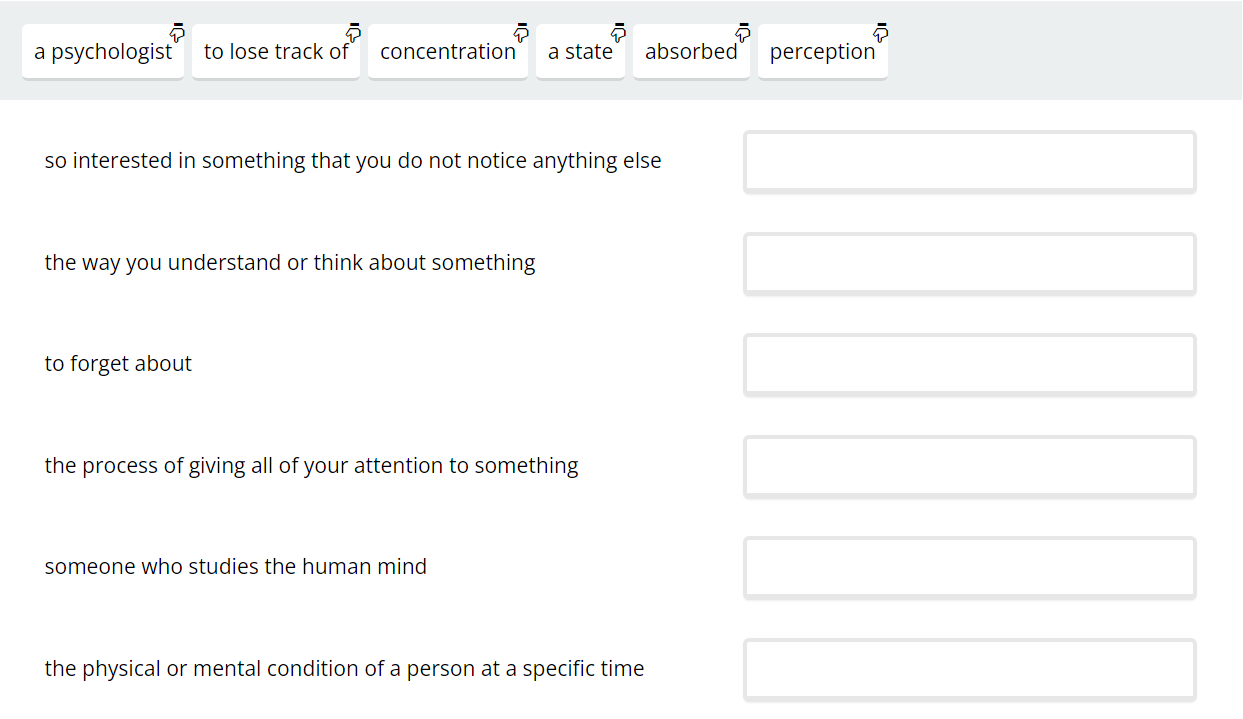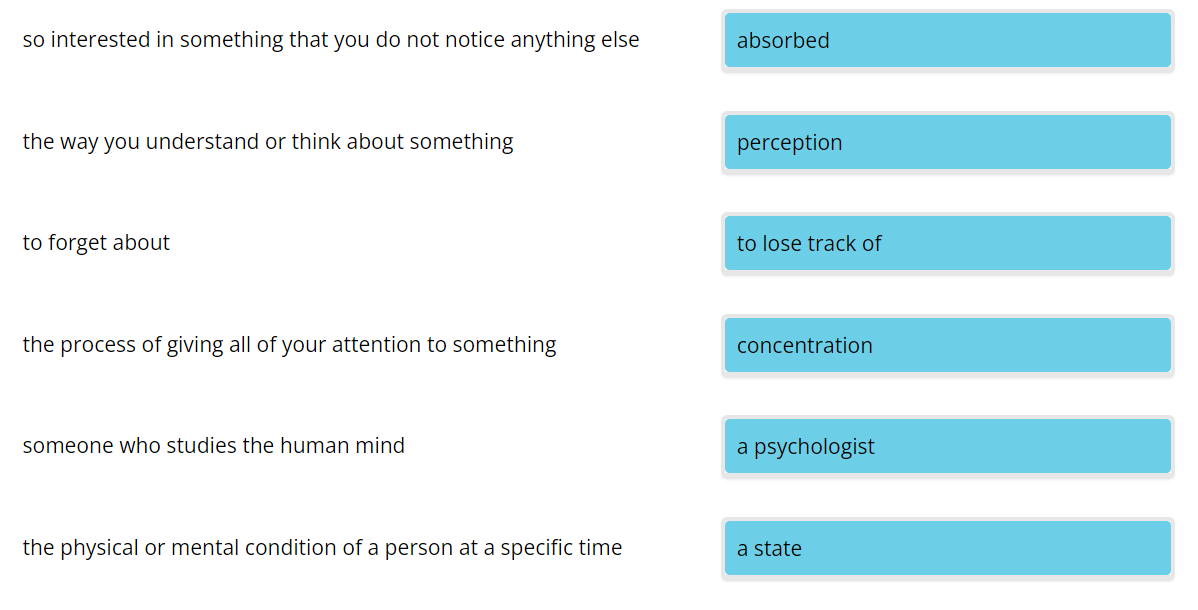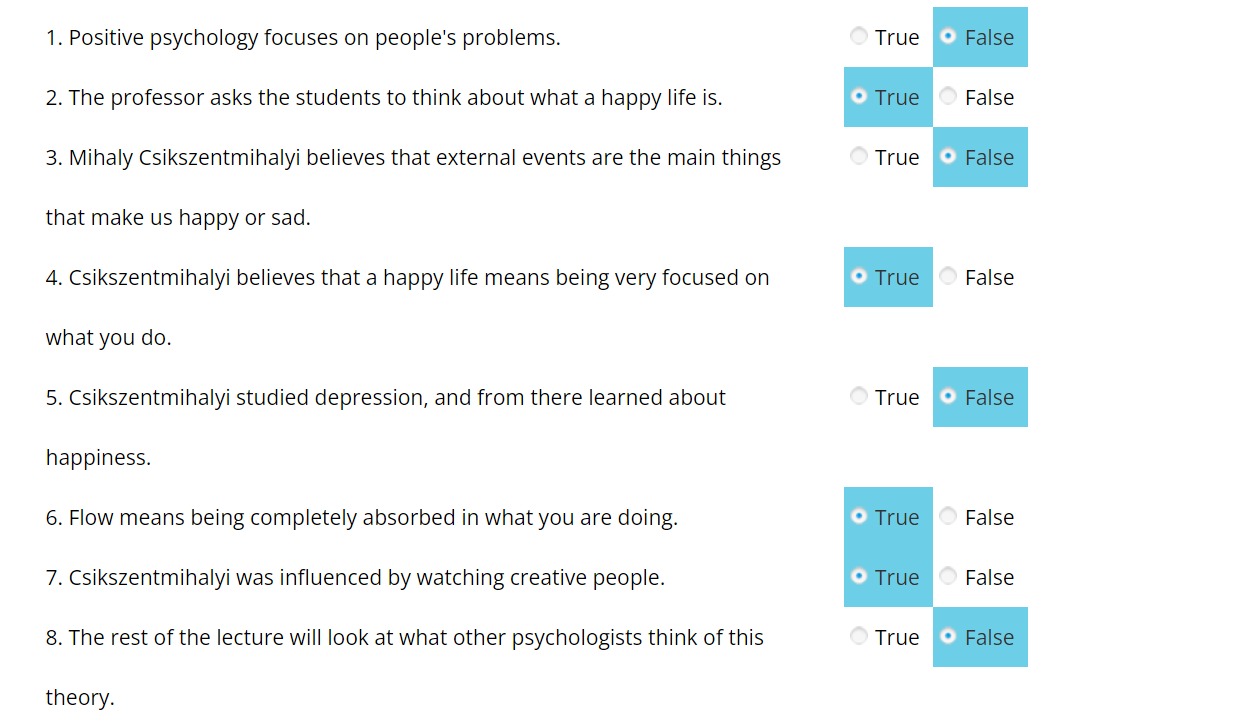【B1-Listening】06 An introduction to a lecture-讲座简介
【B1-Listening】06 An introduction to a lecture-讲座简介

Listen to the introduction of a psychology lecture to practise and improve your listening skills.听心理学讲座的介绍来练习和提高你的听力技巧。
Do the preparation task first. Then listen to the audio and do the exercises.先做好准备工作。然后听音频并做练习。
An introduction to a lecture – preparation
Match the words with the definitions.
- Question
Vocabulary
1.perception
2.to lose track of
3.a psychologist
4.a state
5.concentration
6.absorbed
Definitions
a.so interested in something that you do not notice anything else
b.the way you understand or think about something
c.to forget about
d.the process of giving all of your attention to something
e.someone who studies the human mind
f.the physical or mental condition of a person at a specific time

- Answer
- so interested in something that you do not notice anything else
absorbed- the way you understand or think about something
perception- to forget about
to lose track of- the process of giving all of your attention to something
concentration- someone who studies the human mind
a psychologist- the physical or mental condition of a person at a specific time
a state
TODO

Transcript
English
Good afternoon, everyone. Welcome to the first lecture of our new course in Positive Psychology. While some people may associate psychology with looking at what’s wrong with us, and at what problems we have, there is much more to psychology than that. Positive psychology, for example, looks at how to help people become happier.
This lecture begins with a question: what makes a happy life?
Now, I’m going to give you one possible answer. A happy life is a life in which you are completely absorbed in what you do. Now, how does this compare with what you and your partner said?
This answer comes from the work of Mihaly Csikszentmihalyi and the theory of flow. Csikszentmihalyi is a psychologist who has spent much of his professional life on the study of what makes people happy and how we can find happiness.
Csikszentmihalyi suggests the theory that happiness is not caused by external events or things that happen to us. Our perception of these things and how we see these events either makes us happy or sad. In other words, if we want happiness, we have to actively look for it. However, this does not mean that we should always look for happiness! Csikszentmihalyi believed that our happiest moments happen when we are in a state of flow.
The theory of flow can be summarised like this: when we are totally involved in, or focused on, what we are doing, we are in a state of flow.
Csikszentmihalyi got the inspiration for this theory when he noticed how artists worked in a studio. They completely lost track of time, they didn’t notice they were hungry or tired, and they could work for hours, even days, without stopping. Anyone I have spoken to who has experienced this state of concentration has said it’s difficult to explain. The best way to explain it is that it is like being in a river and the flow of the water carries you away.
For the rest of this lecture, I will explore this theory of flow in more detail. First we will look at Csikszentmihalyi’s life, and how it influenced his ideas. Then we will look at the conditions that go with a state of flow. What creates flow, exactly? Finally, we will look at activities that can help us achieve flow in our everyday lives. Will this course make you happy for life? Well, maybe. Maybe.
Right, let’s get started. If you look at the next slide …
English-Chinese
Good afternoon, everyone. Welcome to the first lecture of our new course in Positive Psychology. While some people may associate psychology with looking at what’s wrong with us, and at what problems we have, there is much more to psychology than that. Positive psychology, for example, looks at how to help people become happier.大家下午好。欢迎来到我们积极心理学新课程的第一讲。虽然有些人可能将心理学与观察我们的毛病和问题联系在一起,但心理学的意义远不止于此。例如,积极心理学研究如何帮助人们变得更快乐。
This lecture begins with a question: what makes a happy life?本讲座以一个问题开始:什么才是幸福的生活?
Now, I’m going to give you one possible answer. A happy life is a life in which you are completely absorbed in what you do. Now, how does this compare with what you and your partner said? 现在,我将给你一个可能的答案。幸福的生活就是完全专注于自己所做的事情的生活。现在,这与您和您的伴侣所说的相比如何?
This answer comes from the work of Mihaly Csikszentmihalyi and the theory of flow. Csikszentmihalyi is a psychologist who has spent much of his professional life on the study of what makes people happy and how we can find happiness.这个答案来自 Mihaly Csikszentmihalyi 的著作和心流理论。 Csikszentmihalyi 是一位心理学家,他将职业生涯的大部分时间用于研究什么能让人们快乐以及我们如何找到快乐。
Csikszentmihalyi suggests the theory that happiness is not caused by external events or things that happen to us. Our perception of these things and how we see these events either makes us happy or sad. In other words, if we want happiness, we have to actively look for it. However, this does not mean that we should always look for happiness! Csikszentmihalyi believed that our happiest moments happen when we are in a state of flow.Csikszentmihalyi 提出了这样的理论:幸福不是由外部事件或发生在我们身上的事情引起的。我们对这些事情的看法以及我们如何看待这些事件要么让我们高兴,要么让我们悲伤。换句话说,如果我们想要幸福,就必须主动去寻找。然而,这并不意味着我们应该永远寻找幸福! Csikszentmihalyi 相信,当我们处于心流状态时,我们最幸福的时刻就会发生。
The theory of flow can be summarised like this: when we are totally involved in, or focused on, what we are doing, we are in a state of flow.心流理论可以这样概括:当我们完全投入或专注于我们正在做的事情时,我们就处于心流状态。
Csikszentmihalyi got the inspiration for this theory when he noticed how artists worked in a studio. They completely lost track of time, they didn’t notice they were hungry or tired, and they could work for hours, even days, without stopping. Anyone I have spoken to who has experienced this state of concentration has said it’s difficult to explain. The best way to explain it is that it is like being in a river and the flow of the water carries you away.当奇克森特米哈伊注意到艺术家如何在工作室工作时,他得到了这一理论的灵感。他们完全忘记了时间,他们没有注意到自己饿了或累了,他们可以不停地工作几个小时,甚至几天。与我交谈过的任何经历过这种专注状态的人都说这很难解释。最好的解释是,它就像在一条河里,水流把你带走。
For the rest of this lecture, I will explore this theory of flow in more detail. First we will look at Csikszentmihalyi’s life, and how it influenced his ideas. Then we will look at the conditions that go with a state of flow. What creates flow, exactly? Finally, we will look at activities that can help us achieve flow in our everyday lives. Will this course make you happy for life? Well, maybe. Maybe. 在本次讲座的其余部分,我将更详细地探讨这种流动理论。首先,我们来看看奇克森特米哈伊的生活,以及它如何影响他的思想。然后我们将看看与心流状态相关的条件。究竟是什么创造了心流?最后,我们将研究可以帮助我们在日常生活中实现心流的活动。这门课程会让你一生幸福吗?也许。或许。
Right, let’s get started. If you look at the next slide …好的,让我们开始吧。如果你看下一张幻灯片……
Task1
An introduction to a lecture – 1
Put the topics in the order they are mentioned.
Write a number (1–6) to put the topics in the order they are mentioned.
- Question
()Examples of flow
()An outline of the rest of the lecture
()One definition of a happy life
()The difference between psychology and positive psychology
()Csikszentmihalyi and his work
()What makes a happy life?

- Answer
(2)What makes a happy life?
(4)Csikszentmihalyi and his work
(6)An outline of the rest of the lecture
(1)The difference between psychology and positive psychology
(5)Examples of flow
(3)One definition of a happy life

Task2
An introduction to a lecture – 2
Are the sentences true or false?
- Question
- Positive psychology focuses on people’s problems.
True
False- The teacher asks the students to think about what a happy life is.
True
False- Mihaly Csikszentmihalyi believes that external events are the main things that make us happy or sad.
True
False- Csikszentmihalyi believes that a happy life means being very focused on what you do.
True
False- Csikszentmihalyi studied depression, and from there learned about happiness.
True
False- Flow means being completely absorbed in what you are doing.
True
False- Csikszentmihalyi was influenced by watching creative people.
True
False- The rest of the lecture will look at what other psychologists think of this theory.
True
False
- Answer
- Positive psychology focuses on people’s problems.
True
✔False- The teacher asks the students to think about what a happy life is.
✔True
False- Mihaly Csikszentmihalyi believes that external events are the main things that make us happy or sad.
True
✔False- Csikszentmihalyi believes that a happy life means being very focused on what you do.
✔True
False- Csikszentmihalyi studied depression, and from there learned about happiness.
True
✔False- Flow means being completely absorbed in what you are doing.
✔True
False- Csikszentmihalyi was influenced by watching creative people.
✔True
False- The rest of the lecture will look at what other psychologists think of this theory.
True
✔False
- 今天午餐时间东部地区将开始下雨。
正确 ✔错误- 西北地区的天气会比南方更糟糕。
✔正确 错误- 今晚利兹将有雷声。
正确 ✔错误- 本周英格兰大部分地区将会很热。
✔正确 错误- 周末,潮湿天气将从北方转移到南方。
✔正确 错误- 下雨时天气会很热。
正确 ✔错误

Discussion
Have you ever been in a ‘state of flow’ while doing an activity?
您在进行某项活动时是否曾处于“心流状态”?
Vocabulary
perception
- 简易
英/pəˈsepʃ(ə)n/美/pərˈsepʃ(ə)n/
n.看法,认识;感觉,感知;洞察力;<法律>(租金、农作物等的)收取,占有高中 | CET4 | CET6 | IELTS | TOEFL | GRE | GMAT | SAT | 商务英语
复数perceptions - 《柯林斯英汉双解大词典》
perception/pəˈsɛpʃən/|CET4 TEM8
N-COUNT Your perception of something is the way that you think about it or the impression you have of it. 理解; 看法
• He is interested in how our perceptions of death affect the way we live.
他对我们的死亡观如何影响我们的生活方式感兴趣。N-UNCOUNT Someone who has perception realizes or notices things that are not obvious. 洞察力
• It did not require a lot of perception to realize the interview was over.
不需要很强的洞察力就可以意识到面试结束了。N-COUNT Perception is the recognition of things using your senses, especially the sense of sight. (尤指通过视觉的) 感知
concentration
- 简易
英/ˌkɒns(ə)nˈtreɪʃ(ə)n/美/ˌkɑːns(ə)nˈtreɪʃ(ə)n/
n.专心,专注;关注,重视;集中,聚集;含量,浓度高中 | CET4 | CET6 | 考研 | IELTS | TOEFL | GRE | GMAT | SAT | 商务英语
复数concentrations
- 《柯林斯英汉双解大词典》
concentration/ˌkɒnsənˈtreɪʃən/|CET4 TEM4
N-UNCOUNT Concentration on something involves giving all your attention to it. 专注
• Neal kept interrupting, breaking my concentration.
尼尔不断打扰,打断我的注意力。N-VAR A concentration of something is a large amount of it or large numbers of it in a small area. 集中
• The area has one of the world’s greatest concentrations of wildlife.
该地区有世界上野生生物最集中的区域之一。N-VAR The concentration of a substance is the proportion of essential ingredients or substances in it. 浓度
• pH is a measure of the concentration of free hydrogen atoms in a solution.
pH值是溶液中游离氢原子浓度的计量单位。